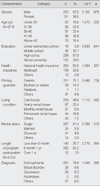Abstract
Purpose
This study was conducted to determine the predictors of employment intention for mentally disabled persons.
Methods
Mentally disabled persons who had participated in rehabilitation programs in one of 16 mental health centers and 9 community rehabilitation centers located in Seoul and Kyunggi province were recruited for this study. A random sampling method was used and 414 respondents were used for final analysis. Data was analyzed by Pearson's correlation, and stepwise multiple regression using the SPSS Win 14.0.
Results
The predictors influencing employment intention of the mentally disabled person were observed as employment desire (β=.48), guardian's expectation (β=.26), professional's support (β=.23), financial management (β=.10), eating habits (β=.07), and quality of life (β=-.01). Six factors explained 61.1% of employment intention of mentally disabled persons.
Figures and Tables
Table 3
Correlation among Variables

x1=Employment intention; x2=Quality of life; x3=Employment desire; x4=Self esteem; x5=Guardian's expectation; x6=Friend's support; x7=Professional's support; x8=Eating habit; x9=Hygiene; x10=Appearance care; x11=Environment arrangement; x12=Financial management; x13=Health management; x14=Daily life; x15=Age; x16=Period of mental health center use; x17=Frequency of hospital admission.
*p<.05; **p<.01.
References
1. Anthony WA. Characteristics of people with psychiatric disabilities that are predictive of entry into the rehabilitation process and successful employment. Psychosocial Rehabilitation Journal. 1994. 17(3):3–10.

2. Bond GR, Resnick SG, Drake RE, Xie H, McHugo GJ, Bebout RR. Does competitive employment improve nonvocational outcomes in people with severe mental illness? Journal of Consulting and Clinical Psychology. 2001. 69:489–501.
3. Choi EY. A exploratory research on the vocational rehabilitation factors affecting on the job maintenance for the mental disorders. 2002. Seoul: Seoul Women's University;Unpublished master's thesis.
4. Choi HS. A study on the predictors of vocational rehabilitation outcome for persons with schizophrenia. 1999. Seoul: Seoul Women's University;Unpublished doctoral dissertation.
5. Choi LH. A study on the factors influencing job maintenance period of mental disorder. 2005. Iksan: Wonkwang University;Unpublished master's thesis.
6. Chun BJ. Self-esteem; A test of its measurability. Younsei Nonchong. 1974. 11:109–129.
7. Coopersmith S. The antecedents of self-esteem. 1981. Palo Alto, CA: Consulting Psychologists Press.
8. Dahlem NW, Zimet GD, Walker RR. The Multidimensional Scale of Perceived Social Support: A confirmation study. Journal of Clinical Psychology. 1991. 47:756–761.

9. Disabled Persons Welfare Act. 2004. Retrived March 1, 2008. The national Assembly of the Republic of Korea;from http://likms.assembly.go.kr.
10. Katz S, Akpom CA. Index of ADL. Medical Care. 1976. 14:Suppl 5. 116–118.
11. Kim HS. A study on desire for employment among person with mental disorder. 2006. Daegu: Daegu University;Unpublished master's thesis.
12. Lawton MP, Brody EM. Assessment of older people: Self-maintaining and instrumental activities of daily living. The Gerontologist. 1969. 9:179–186.

13. Lee GJ. A study on the factor affecting on the duration of job maintenance for the mental disorders. 2000. Seoul: Ewha women's University;Unpublished master's thesis.
14. Lee JH. A study on environmental factors influencing the social adjustment of the mentally disabled: Focusing on users of mental health service centers in local community. 2003. Daejeon: Chungnam University;Unpublished master's thesis.
15. Lee JH. Effects of community mental health programs on the social integration of the mentally ill. 2005. Jinju: Gyeongsang National University;Unpublished master's thesis.
16. Lee YR. A Study on the factors predicting on social integration of the mental disorders in social rehabilitation facilities. 2001. Seoul: Ewha women's University;Unpublished master's thesis.
17. Lehman AF. The well-being of chronic mental patients. Archives of General Psychiatry. 1983. 40:369–373.

18. Mechanic D. The challenge of chronic mental illness: A retrospective and prospective view. Hospital and Community Psychiatry. 1986. 37:891–896.

19. Mental Health Act. Retrieved March 1, 2008. from http://www.lawnb.com.
20. Ministry of Health and Welfare. Social welfare programs for mentally disabled persons. 2007. Ministry of Health and Welfare.
21. Nam SJ. A study on the needs of vocational rehabilitation for persons with mental disability. 2002. Seoul: Korea University;Unpublished master's thesis.
22. Noh IY. Comparative research of the medical cost, the quality of life, the family burden of the mentally ill before and after the community mental health service. 2001. Seoul: Kyung hee University;Unpublished master's thesis.
23. Park JY. A comparative study on quality of life self-esteem with work status in mentally handicapped person. 2002. Seoul: Korea University;Unpublished master's thesis.
24. Pilisuk M. A job and a home: Social networks and the integration of the mentally disabled in the community. American Journal of Orthopsychiatry. 2001. 71:49–60.

25. Rogenberg M. Society and the adolescent self-image. 1973. Princeton, NJ: Princeton University Press.
26. Ryu JS. A study on the factors affecting on the job maintenance for the mental disorders. 2003. Seoul: Seoul Women's University;Unpublished master's thesis.
27. Tsang H, Ng B, Chiu IY, Mann S. Predictors of post-hospital employment status for psychiatric patients in Hong Kong: From perceptions of rehabilitation professionals to empirical evidence. The International Journal of Social Psychiatry. 2000. 46:306–312.

28. Van Dongen CJ. Quality of life and self-esteem in working and nonworking persons with mental illness. Community Mental Health Journal. 1996. 32:535–548.

29. Vaquera E, Kao G. Do you like me as much as I like you? Friendship reciprocity and its effects on school outcomes among adolescents. Social Science Research. 2008. 37:55–72.

30. Wehman P, McLaughlin P. Vocational curriculum for mentally disabled persons. 1980. Baltimore, MD: University Park Press.
31. WHO. International classification of functioning, disability and health. Short version. 1980. Retrieved March 1, 2008. Geneva: WHO;from http://www.who.int/classifications/icf.
32. Woo JY. Relationships between ego-states and quality of life among person with mental disorders. 2002. Yongin: Dankook University;Unpublished master's thesis.




 PDF
PDF ePub
ePub Citation
Citation Print
Print





 XML Download
XML Download